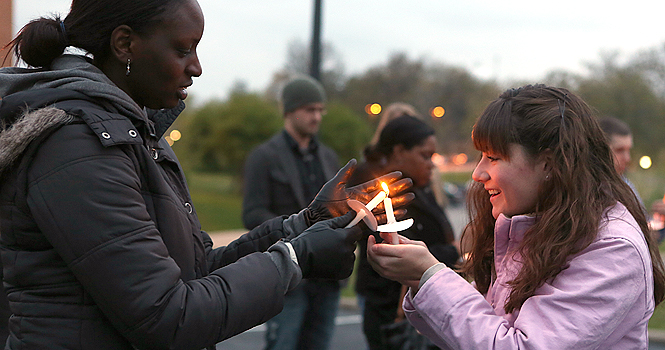Take Back the Night lets sexual assault victims vent and reflect in a candlelight vigil
Lorriane Odhiambo lights Katelynn Dearth’s candle prior to the Take Back The Night march Thursday evening. Photo by Coty Giannelli.
April 27, 2012
“Women and men unite!” cried a young adult male with a megaphone marching toward the Student Center. “Take back the night!”
Men and women marched across Kent State Thursday for Take Back the Night — a national movement for people to reflect on sexual assault and rape.
People gathered around the Women’s Center at 8 p.m. to listen to several people speak about their experience with sexual assault and to burn the names and memories of sexual assault incidents that happened in their lives. Beth Vild, a Kent State alumna, was one of the individuals who chose to read a poem about her experience with sexual assault.
“I’m a survivor,” Vild said. “I do [this] every year as relief.”
Amanda Kenney, program coordinator at the Women’s Center, said the Women’s Center also hung up some of the T-shirts from the Clothesline Project to honor those who have been assaulted. She said all of the T-shirts were designed by either a sexual assault victim or loved one.
“The Clothesline Project is an avenue for survivors and friends to make T-shirts,” Kenney said. “Some have lyrics, some have pictures, some quotes. It’s whatever they really want.”
Kenney said the Take Back the Night Foundation chose Kent State to be one of 10 “points” or locations to reflect on the issue of sexual assault. She said though the event has been hosted at Kent State before since the 1970s, this is the third year it’s been sponsored directly by the Women’s Center.
Lorriane Odhiambo, a graduate student in the College of Public Health, said she often attends events sponsored by the Women’s Center because she supports women’s issues.
“This event is for women who don’t really know what they’re going through,” Odhiambo said. “People don’t usually talk about assault, and I’m grateful here at Kent State, there’s a place to go.”
Contact Megan Wilkinson at [email protected].
Sexual Assault Statistics in Kent
During 2011, there were two official reports of sexual assault on the Kent State campus. Alice Ickes, the Kent State police victim’s advocate, said one was rape, and the other was a sexual imposition. She said all reports will be in by October 2012.
“We only cover KSU property,” Ickes said. “Students come and think Eagles Landing is part of Kent State, but it’s not.”
Kent City Police said they did not have enough time to go through 2011 records.
Ickes said if a student is sexually assaulted off campus, Kent State police will direct them to the right source to call for help.
Michquel Penn, Kent State community resource officer, wrote in an email that sexual assault victims should call for help and medical attention as soon as it’s safe for them.
“This does not mean they have to prosecute the offender,” Penn wrote in an email. “[And] there is not cost for a rape evidence collection exam.”
Both Penn and Ickes gave the following advice for students who wish to prevent sexual assault:
Avoid excessive drinking and the use of drugs. Penn said some people who commit sexual assault are more likely to do so in an environment where people are drinking and using illicit drugs.
Leave and return home with the same number of people. Ickes said you should try not to leave friends behind when out in public, and discouraged bringing strangers back home.
Be in a safe place. Ickes said if you go out drinking, it’s better to do it in a familiar place, or have close friends with you to make sure no one takes advantage of you.
What makes a case a ‘sexual assault’?
Penn said sexual assault is a crime that’s meant to sexually hurt, control or humiliate another person.
She said the following cases can be brought up to police as sexual assault:
Person who felt forced to have sex
Person who felt threatened to have sex
Person who is physically or mentally incapacitated, and cannot make sound judgment
Person who has sex when he was under the influence of alcohol, and never consented

























